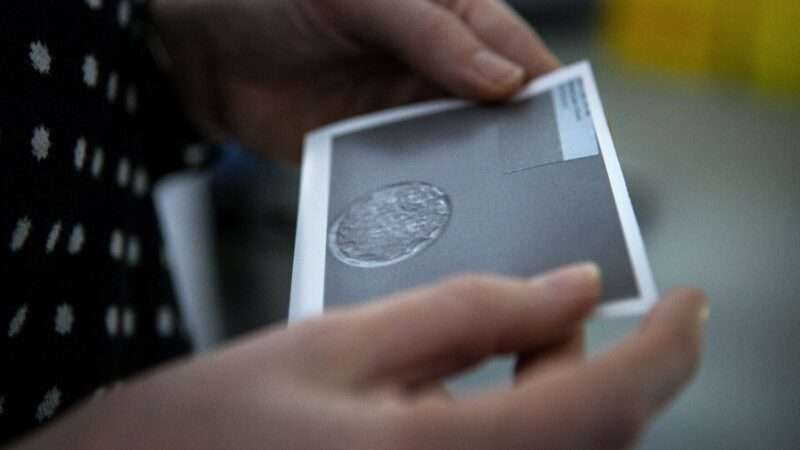
Frozen embryos are “children” under Alabama law, the state’s Supreme Court says. Its decision could have major implications for the future of fertility treatments in the state.
Frozen embryos are “unborn children” and “unborn children are ‘children,'” Justice Jay Mitchell wrote in the court’s main opinion. Only two of nine justices dissented from the holding that an 1872 wrongful death statute applies to the destruction of frozen embryos.
The ruling seems to represent a turn toward judicial activism among members of Alabama’s Supreme Court, which for a long time held that the law’s text could not justify reading it to include “unborn children”—let alone frozen embryos.
It also portends a creeping Christian conservatism into court decisions, with Alabama Supreme Court Justice Tom Parker citing the Bible in his legal reasoning. In a concurring opinion, Parker justifies prohibitions on murder not by invoking classical liberal principles, like natural rights, but rather on the basis of “Man’s creation in God’s image” and the “you shall not murder” edict of the Sixth Commandment. “Human life cannot be wrongfully destroyed without incurring the wrath of a holy God, who views the destruction of His image as an affront to Himself,” Parker writes.
Embryos Destroyed
The decision stems from suits brought by former patients of the Center for Reproductive Medicine in Mobile, Alabama. These patients—couples James and Emily LePage, William and Caroline Fonde, and Felicia Burdick-Aysenne and Scott Aysenne—had used in vitro fertilization (IVF) to successfully have several children and still had some embryos stored in the Center’s “cryogenic nursery.” In December 2020, a patient at the Mobile Infirmary Medical Center (which the Center was a part of) entered the cryogenic nursery unauthorized and proceeded to remove and then drop some of their frozen embryos, destroying them.
The couples sued the fertility clinic and the hospital, citing Alabama’s Wrongful Death of a Minor Act. This 1872 law lets parents sue for monetary damages “when the death of a minor child is caused by the wrongful act, omission, or negligence of any person.”
The LePages and the Fondes brought a joint lawsuit, and a separate suit was filed by the Aysennes. Both suits alleged negligence and the Aysenne suit also alleged wantonness and breach-of-contract.
A trial court granted the Center’s motion to dismiss all but the breach-of-contract claim. “The cryopreserved, in vitro embryos involved in this case do not fit within the definition of a ‘person'” or “‘child,'” the lower court held.
The three couples appealed, and their suits were consolidated for Supreme Court purposes.
No Exceptions for “Extrauterine Children”
In a first-of-its-kind decision, the Alabama Supreme Court decided that frozen embryos are, indeed, children, rejecting the lower court’s dismissal of the couples’ wrongful death claims.
In the court’s main opinion, Justice Jay Mitchell referred to frozen embryos in turn as “embryonic children” and “extrauterine children.”
While the state’s Wrongful Death of a Minor statute doesn’t explicitly include “unborn children”—let alone “extrauterine children”—in its purview, “the ordinary meaning of ‘child’ includes children who have not yet been born,” asserted Mitchell.
Furthermore, Alabama’s Supreme Court “has long held that unborn children are ‘children’ for purposes of Alabama’s that law,” he wrote. The central question in this case, said Mitchell, is “whether the Act contains an unwritten exception to that rule for extrauterine children—that is, unborn children who are located outside of a biological uterus at the time they are killed.”
The couples in this case raised some truly ridiculous arguments for why such an “exception” shouldn’t exist. They argued that a finding that the Wrongful Death of a Minor Act doesn’t apply to unborn children (including frozen embryos) would mean partial-birth abortions are legal, since the baby would no longer be in utero but would also not be fully born. They also suggested it would OK murdering hypothetical toddlers entirely gestated in artificial wombs, since such children—no matter how old they got—would not technically have been born.
Amazingly, the majority lent credence to these crazy arguments. They are “weighty concerns,” wrote Mitchell, albeit ones that needn’t be resolved at this time since “neither the text of the Wrongful Death of a Minor Act nor this Court’s precedents exclude extrauterine children from the Act’s coverage.”
Dissent, Dissent, Dissent
Not all of the justices agreed with the majority’s logic, and some offered quite scathing rebukes of it.
For instance, Justice Brady E. Mendheim—who concurred with the result of the main opinion but disagreed with some of its reasoning—doesn’t think that it’s so clear cut that “child” includes frozen embryos. For one thing, the wrongful death statute in question was written a century before IVF was even a scientific possibility. Furthermore, other parts of Alabama law, including the 2019 Human Life Protection Act, explicitly define an unborn child as a human being in utero.
Justice Will Sellers also rejected the idea that this is an easy and obvious call. “Any sequence of linguistic gymnastics, cannot yield the conclusion that embryos developed through in vitro fertilization were intended by the legislature to be included in the definition of ‘person,’ much less the definition of ‘minor child,'” he wrote. Rather, the inclusion of in utero children in certain statutes was there to allow for punishment of violence perpetrated against pregnant women. “To equate an embryo stored in a specialized freezer with a fetus inside of a mother is engaging in an exercise of result-oriented, intellectual sophistry, which I am unwilling to entertain,” Sellers added.
Meanwhile, Justice Greg Cook—who dissented in full from the main opinion—rejects the idea that the 1872 law meant to include fetuses and zygotes in its definition of children, even when they are in utero.
The main opinion suggested that the “leading dictionary of that time defined the word ‘child’ as ‘the immediate progeny of parents’ and indicated that this term encompassed children in the womb,” notes Cook. But if you look at the full entry in the cited dictionary, it indicates the opposite, saying “the term is applied to infants from their birth.”
Furthermore, interpreting the Wrongful Death Act to include unborn children is a recent phenomenon. “There is no doubt that the common law [in 1872] did not consider an unborn infant to be a child capable of being killed for the purpose of civil liability or criminal-homicide liability,” wrote Cook. “In fact, for 100 years after the passage of the Wrongful Death Act, our caselaw did not allow a claim for the death of an unborn infant, confirming that the common law in 1872 did not recognize that an unborn infant (much less a frozen embryo) was a ‘minor child’ who could be killed.”
Thus, applying the wrongful death act to the loss of frozen embryos runs counter to the philosophy of originalism (the idea, common among libertarians and conservatives, that laws should be interpreted only as they were originally intended) and closer to the progressive idea of a malleable “living Constitution,” suggests Cook. And he’s not a fan. “It is not our role to expand the reach of a statute and “breathe life” into it by updating or amending it,” Cook writes. If the legislature thinks the law needs expanding, it can do so.
Cook and Mendheim both object to characterizing the defense’s position as seeking an “exception” for frozen embryos, because to declare it an exception to the state’s protection of minor children assumes that embryos are minor children—a point that’s far from a given. And they both pan the tacit acceptance of the out-there hypotheticals offered by the patients.
“The main opinion ignores the fact that it is not now—or for the foreseeable future—scientifically possible to develop a child in an artificial womb so that such a scenario could somehow unfold,” writes Mendheim. Should that become possible, “the answer to this futuristic hypothetical is simple,” writes Cook: “the Legislature can address future technologies and can do so far better than this Court.”
Bibles and Broad Reach
Pointing out that no other state has interpreted wrongful death laws this way—and a number have specifically rejected it—Cook suggests that being “the sole outlier” should “cause us to carefully reexamine our conclusions.”
He concludes the decision could end IVF in Alabama, since “no rational medical provider would continue to provide services for creating and maintaining frozen embryos knowing that they must continue to maintain such frozen embryos forever or risk the penalty of a Wrongful Death Act claim for punitive damages.”
This fear was echoed by the defendants in this case, who told the court a finding that the statute includes frozen embryos could make IVF prohibitively expensive.
Barbara Collura, president and CEO of RESOLVE: The National Infertility Association, called the court’s decision “terrifying” for people “who need in-vitro fertilization to build their families.”
Chief Justice Parker’s opinion suggests that their fears are not unfounded.
His opinion is chilling in the way is showcases the theocratic underpinnings on which he sees Alabama governance resting. Pointing to a 2018 amendment declaring it “the public policy of this state to recognize and support the sanctity of unborn life,” he notes that the term sanctity can be defined as “holiness of life and character,” godliness, and “the quality or state of being holy or sacred.” He goes on to cite the King James Bible, noting that in Genesis man’s creation was described as being “in the image of God.” Its on these foundations that the legal treatment of frozen embryos should rest, he suggests.
According to Parker, this would not mean the end of IVF in Alabama. But it could mean changes that would seriously upend the IVF process.
In IVF, the process of preparing the body for ovulation and harvesting eggs can be extremely taxing on women’s bodies, as well as time-consuming and expensive. After this, not all of the eggs collected may be successfully fertilized. And when viable embryos are created, it may take multiple tries at transferring one into a woman’s body before implantation is successful. For all of these reasons, it makes sense for doctors to collect myriad eggs at one time, fertilize these eggs, and then freeze the viable embryos for later transfer, rather than harvesting eggs and creating a single new embryo for each transfer. (This also helps people who may want to create embryos when they are younger to use when they are somewhat older, or who may face illness that will impede their future fertility.) And to maximize the chances of success, doctors sometimes transfer two or more embryos at once.
Treating embryos as having the full legal rights of children could imperil all of these practices.
In Italy, “cryopreservation of embryos” is banned “except when a bona fide health risk or force majeure prevented the embryos from being transferred immediately after their creation,” writes Parker. He also points approvingly to countries with other stringent regulations, such as a rule limiting the number of embryos that can be transferred at a time.
“These regulations adopted by other countries seem much more likely to comport with upholding the sanctity of life,” Parker concludes, writing that “certain changes to the IVF industry’s current creation and handling of embryos in Alabama will result from this decision.”
Even if the ruling doesn’t end IVF in Alabama, it could pave the way for changes that make fertility treatments more difficult, time-consuming, expensive, and impractical.
Today’s Image

The post Frozen Embryos Are Now Children Under Alabama Law appeared first on Reason.com.









